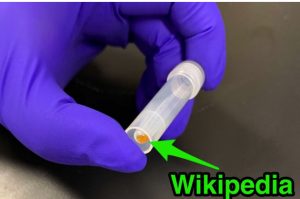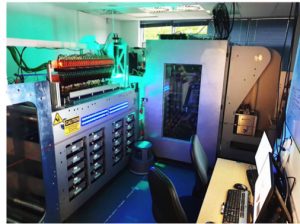Start-Up Profile: Catalog Technologies
In DNA for storage
This is a Press Release edited by StorageNewsletter.com on September 25, 2020 at 2:12 pmCompany:
Catalog Technologies, Inc. (MIT spinoff)
HQs:
Boston, MA

Date founded:
September 2016
Financial funding:
- Seed rounds of $250,000 in 2016, $5 million in 2017, $4 million in 2018
- $10 million in Series A in Septembre 2020 with Horizons Ventures, leading this oversubscribed round, joined by Airbus Ventures, and this investment to be used to fund early product trials and continued R&D.
- In total, Catalog has raised $21 million in 5 rounds from 26 investors including NEA, OS Fund, Data Collective, AME Cloud Ventures, and SOSV.
Founders and main executives:
Founded by MIT scientists and IBM executive David Turek new CTO and co-founders are Hyunjun ParkNathaniel Roquet and Dr. Darren Link.
![]() CEO and co-founder Hyunjun Park obtained his BS at Seoul National University, PhD in microbiology at the University of Wisconsin Madison, and conducted postdoctoral research at MIT.
CEO and co-founder Hyunjun Park obtained his BS at Seoul National University, PhD in microbiology at the University of Wisconsin Madison, and conducted postdoctoral research at MIT.
![]() CTO David Turek at IBM for around 21 years, VP deep computing in 1999-2001, VP exascale computing in 2011-2020 and VP technical computing OpenPOWER in 2014-2020
CTO David Turek at IBM for around 21 years, VP deep computing in 1999-2001, VP exascale computing in 2011-2020 and VP technical computing OpenPOWER in 2014-2020
Technology:
DNA as a storage device is orders of magnitude smaller and denser than standard drives. A football field’s worth of storage capacity – or over one billion gigabytes of data – can fit into a sugar cube size container of DNA and remain stable for thousands of years, according to the company.
DNA storage, which uses synthetic DNA, is space effective, sustainable and can fit enormous quantities of data into a tiny footprint.
Scientists have been researching DNA storage for decades, but it was not expected to be commercially viable in the near term. It has been prohibitively slow and expensive.
Catalog’s proprietary method takes a different approach than traditional thinking on DNA storage. As an analogy, assume the information to be stored is a book, which can be stored by copying it. The traditional approach would go about this by transcribing the book from start to finish, letter for letter. This is a time consuming and expensive process. Further, if you want to store a different book, you have to start again from scratch, meaning the cost would be doubled.
Catalog recently demonstrated its technology by storing the full English text version of Wikipedia into synthetic DNA molecules using printer technology, its encoding scheme and chemical protocols. The total amount of data came to 16GB, cheaper than chemical synthesis approaches.

In October 2018, Cambridge Consultants Ltd. and Catalog revealed a partnership and plans for a machine that will encode data in DNA, a collaboration to build PartyBus enabling to encode information in DNA at a speed of 1TB/day, for about 1/1,000,000 the cost of what was possible formerly.
The device is using technology similar to inkjet printers to convert the zeros and ones used to store binary data in traditional storage into a combination of pre-synthesized DNA molecules. This technology can hold a million times more data in the same volume of HDD or SSD.
Firm’s custom-developed DNA writer and storage system, Shannon, can write at a speed of over 10Mb/s and generates over a trillion identifiers in a single run. It can store up to 1.63Tb of compressed data in a single run.
Products description:
Company’s first-gen DNA writer and storage system can be thought of as a printing press that utilizes the typefaces to create the different combinations. Data will be encoded using the fragments of synthetic DNA and then stored in dry powder form, in a test tube.

Partners:
Arch Mission Foundation trying to store human knowledge not just on Earth but even elsewhere in the solar system
Target market:
To replace conventional storage media like HDDs and SSDs
Comments
There were numerous attempts in the past to compete with HDDs and then SSDs in the huge storage market, and without success.
In DNA (Deoxyribonucleic acid) technology, first discovered by by the Swiss physician Friedrich Miescher in 1869, there are already a lot of actors but no products are available as production is a big challenge, prices are high with slow read and write times and there is a big question concerning access time never revealed as far as we know.
Among other start-ups in DNA
| Company | Location | Born in | Total raised in $ million | Activity |
| Evonetix | Essex, UK | 2015 | 46 | DNA for storage, Cambridge Consultants spin-out |
| Molecular Assemblies | San Diego, CA | 2013 | 6.8 | practical method of synthesizing DNA |
| Iridia | Carlsbad, CA | 2016 | 2.5 | DNA-based storage solution; formerly Dodo Omnidata |
| Twist Bioscience | San Francisco, CA | 2013 | 253.1 | pharmaceutical biologics drug discovery and in DNA storage; also in Israel |
Among other organizations in this field:
- North Carolina State University
- Key Laboratory of Advanced Design and Intelligent Computing, Ministry of Education, School of Software, Dalian University, Dalian, China
- DNAscript, Le Kremlin-Bicêtre, France and San Francisco, CA
- ETH Zürich
- Microsoft
- Georgia Tech
- Helixworks Technologies
- University of Washington














 Subscribe to our free daily newsletter
Subscribe to our free daily newsletter

